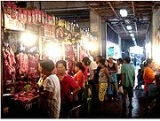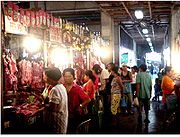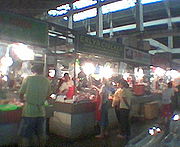
Palengke
Encyclopedia

Public market
Public markets are markets, in public spaces, where independent merchants can sell their products to the public. Typical products sold at public markets include fresh produce and baked goods, locally raised meats and dairy products, and various other food items and handcrafted goods...
common throughout the Philippines
Philippines
The Philippines , officially known as the Republic of the Philippines , is a country in Southeast Asia in the western Pacific Ocean. To its north across the Luzon Strait lies Taiwan. West across the South China Sea sits Vietnam...
.
A palengke is usually composed of several dozen stalls arranged in rows under a shared roof. Management is usually by the local governmental units whose jurisdiction encompasses the physical location of the markets. Certain pieces of legislation however, such as the Cooperatives Code (RA 7160) and the Agriculture and Fisheries Modernization Act (RA 8435) have prescribed that management of the markets be accomplished through cooperative
Cooperative
A cooperative is a business organization owned and operated by a group of individuals for their mutual benefit...
s. There is little control over the day-to-day management of individual stalls, including commodity pricing. This has resulted in what has been called "palengke mechanics". A cited example would be the price of chicken
Chicken (food)
Chicken is the most common type of poultry in the world, and is prepared as food in a wide variety of ways, varying by region and culture.- History :...
during the local 2007 holiday season; lack of demand for the product resulted in prices going up rather than down. It was stated that this was the result of local retailers raising prices to recover financial losses from low demand. The Philippine government retains some control over the price of some commodities sold in palengkes, especially critical foods such as rice
Rice
Rice is the seed of the monocot plants Oryza sativa or Oryza glaberrima . As a cereal grain, it is the most important staple food for a large part of the world's human population, especially in East Asia, Southeast Asia, South Asia, the Middle East, and the West Indies...
. The National Food Authority
National Food Authority (Philippines)
The Philippines' National Food Authority , abbreviated as NFA, is an agency of the Philippine government under the Department of Agriculture responsible for ensuring the food security of the Philippines and the stability of supply and price of the staple grain-rice.-History:The National Food...
calls this regulation
Regulation
Regulation is administrative legislation that constitutes or constrains rights and allocates responsibilities. It can be distinguished from primary legislation on the one hand and judge-made law on the other...
campaign (specifically for rice), Palengke Watch.
The concept has had its criticisms, citing several drawbacks. Palengkes have been described as sites where illicit electric taps and illegal water connections are rampant. In 2002, the Caloocan public market was described by city officials as unsanitary. Some are known to use wells, some illegally constructed, as water sources leading to possibly unsanitary water conditions. Another criticism of the traditional palengke is that it is an old concept that must make way for modern development; a Pasig City
Pasig City
The City of Pasig is one of the city municipalities of Metro Manila in the Philippines and was the former capital of the province of Rizal prior to the formation of this grouping of cities designated as the National Capital Region...
mayor once opined that the palengke was outdated.
In recent years, the typical palengke has been supplanted by larger, more commercialized shopping centers. The rise of shopping mall
Shopping mall
A shopping mall, shopping centre, shopping arcade, shopping precinct or simply mall is one or more buildings forming a complex of shops representing merchandisers, with interconnecting walkways enabling visitors to easily walk from unit to unit, along with a parking area — a modern, indoor version...
s and supermarket
Supermarket
A supermarket, a form of grocery store, is a self-service store offering a wide variety of food and household merchandise, organized into departments...
s have also been cited as threats to the old-school public markets. In a 2002 article, the president of the National Federation of Market Vendors Cooperatives, a cooperative of market vendors throughout the country, stated that the concept of the palengke was an integral part of Philippine
Philippines
The Philippines , officially known as the Republic of the Philippines , is a country in Southeast Asia in the western Pacific Ocean. To its north across the Luzon Strait lies Taiwan. West across the South China Sea sits Vietnam...
culture
Culture
Culture is a term that has many different inter-related meanings. For example, in 1952, Alfred Kroeber and Clyde Kluckhohn compiled a list of 164 definitions of "culture" in Culture: A Critical Review of Concepts and Definitions...
. He stressed that the public market instilled a sense of community that was not evident in the more-commercialized shopping malls. In spite of this, at least one traditional market has been renovated to appeal to more commercialized consumers. A specific case is the "Mutya ng Pasig Market" which was renovated in late 2008, from a traditional palengke into more of a shopping mall.
The concept of the palengke is usually taken hand-in-hand with the concept of local poverty
Poverty
Poverty is the lack of a certain amount of material possessions or money. Absolute poverty or destitution is inability to afford basic human needs, which commonly includes clean and fresh water, nutrition, health care, education, clothing and shelter. About 1.7 billion people are estimated to live...
. Because of this, a few local politician
Politician
A politician, political leader, or political figure is an individual who is involved in influencing public policy and decision making...
s have used it in their nicknames, such as "Mr. Palengke" (or some iteration of it) to signify their affiliation with poverty. Prominent local politician Mar Roxas
Mar Roxas
Manuel "Mar" Araneta Roxas II is a former Senator of the Philippines. He is the son of former Senator Gerry Roxas, and the grandson of former President Manuel Roxas and industrialist J. Amado Araneta....
used the nickname "Mr. Palengke" to his advantage, gaining a senate
Senate of the Philippines
The Senate of the Philippines is the upper chamber of the bicameral legislature of the Philippines, the Congress of the Philippines...
seat in the 2004 Philippine elections.
Etymology

Spanish language
Spanish , also known as Castilian , is a Romance language in the Ibero-Romance group that evolved from several languages and dialects in central-northern Iberia around the 9th century and gradually spread with the expansion of the Kingdom of Castile into central and southern Iberia during the...
word , literally meaning "(wooden) palisade
Palisade
A palisade is a steel or wooden fence or wall of variable height, usually used as a defensive structure.- Typical construction :Typical construction consisted of small or mid sized tree trunks aligned vertically, with no spacing in between. The trunks were sharpened or pointed at the top, and were...
or stockade
Stockade
A stockade is an enclosure of palisades and tall walls made of logs placed side by side vertically with the tops sharpened to provide security.-Stockade as a security fence:...
" and by extension the area enclosed by such a structure for defense, public festivals or some other purpose. The Spanish word is also used to describe a pathway or cluster of tables set up at some place of gathering such as a theatre, tournament or market, and it is from this latter sense that palengke likely derives its usage in the Filipino
Filipino language
This move has drawn much criticism from other regional groups.In 1987, a new constitution introduced many provisions for the language.Article XIV, Section 6, omits any mention of Tagalog as the basis for Filipino, and states that:...
context. In the former Spanish colonies of New Spain
New Spain
New Spain, formally called the Viceroyalty of New Spain , was a viceroyalty of the Spanish colonial empire, comprising primarily territories in what was known then as 'América Septentrional' or North America. Its capital was Mexico City, formerly Tenochtitlan, capital of the Aztec Empire...
in the Americas palenque also described a gathering-place of indios
Indigenous peoples of the Americas
The indigenous peoples of the Americas are the pre-Columbian inhabitants of North and South America, their descendants and other ethnic groups who are identified with those peoples. Indigenous peoples are known in Canada as Aboriginal peoples, and in the United States as Native Americans...
. One false etymology
False etymology
Folk etymology is change in a word or phrase over time resulting from the replacement of an unfamiliar form by a more familiar one. Unanalyzable borrowings from foreign languages, like asparagus, or old compounds such as samblind which have lost their iconic motivation are...
for palengke/palenque appearing in some popular sources mistakenly presumes that palenque is instead a word from the indigenous Mayan languages
Mayan languages
The Mayan languages form a language family spoken in Mesoamerica and northern Central America. Mayan languages are spoken by at least 6 million indigenous Maya, primarily in Guatemala, Mexico, Belize and Honduras...
of Mexico and Central America meaning "gathering place", and that in colonial times the Spanish adopted it to describe a gathering of indigenous peoples. While its use in Latin America to describe such a gathering is attested, the word itself originates from Spanish and not any of the indigenous languages. The mistaken belief of the word's indigenous origin is probably reinforced by the name of the well-known Maya archaeological site in Chiapas
Chiapas
Chiapas officially Estado Libre y Soberano de Chiapas is one of the 31 states that, with the Federal District, comprise the 32 Federal Entities of Mexico. It is divided in 118 municipalities and its capital city is Tuxtla Gutierrez. Other important cites in Chiapas include San Cristóbal de las...
, Mexico—also called Palenque
Palenque
Palenque was a Maya city state in southern Mexico that flourished in the 7th century. The Palenque ruins date back to 100 BC to its fall around 800 AD...
—which was named after the nearby Spanish village when the site was rediscovered in the mid-18th century.

